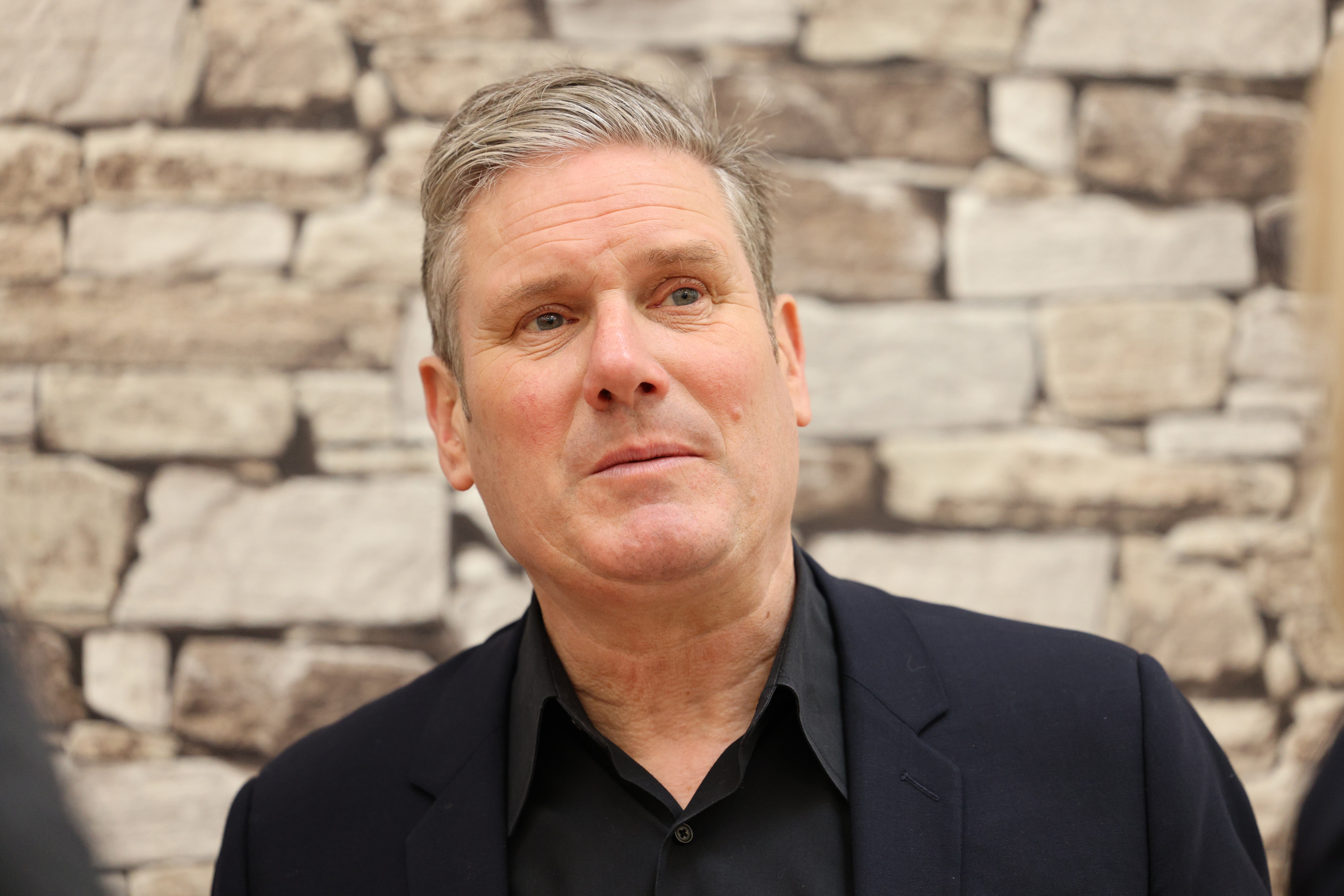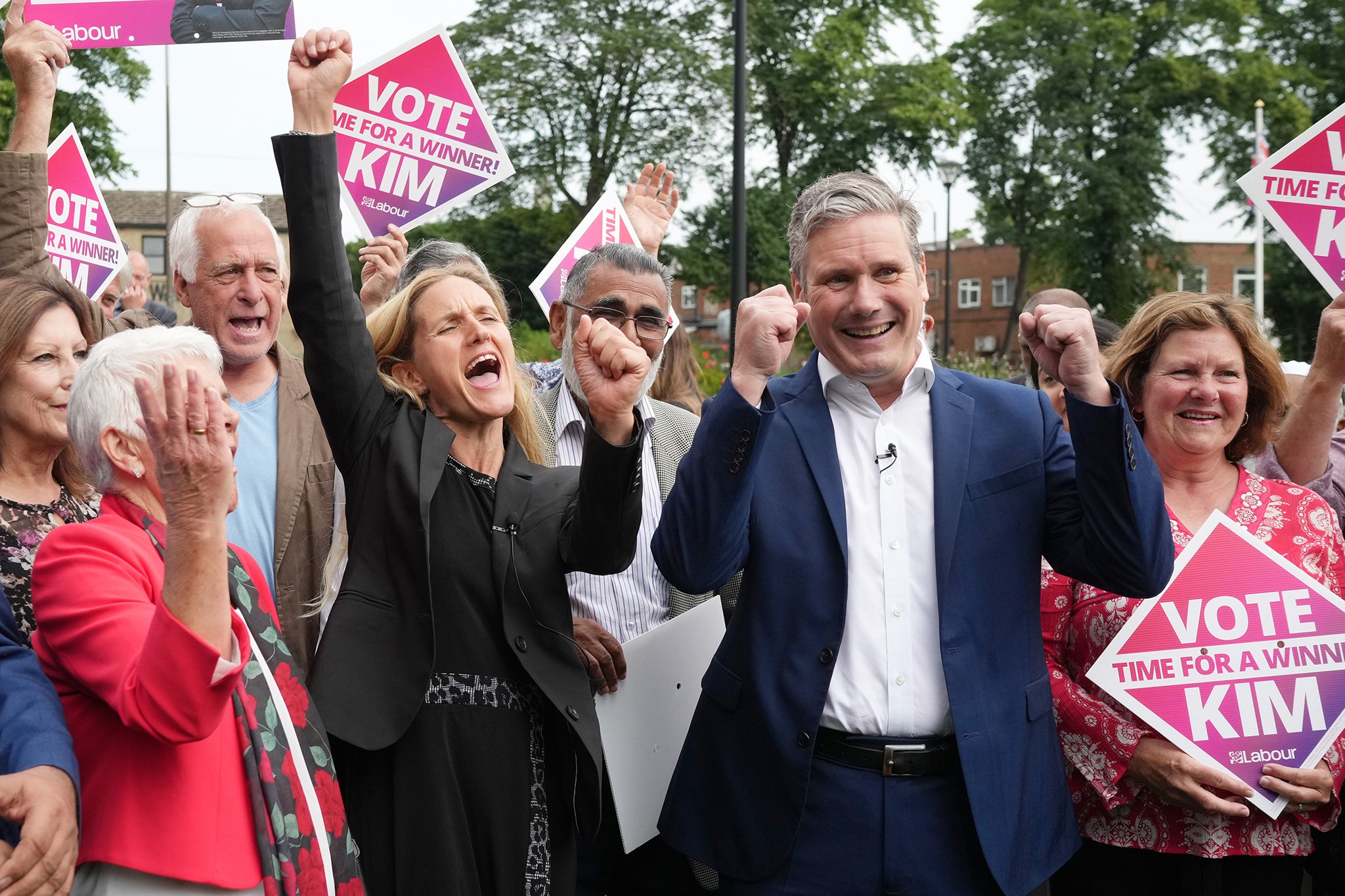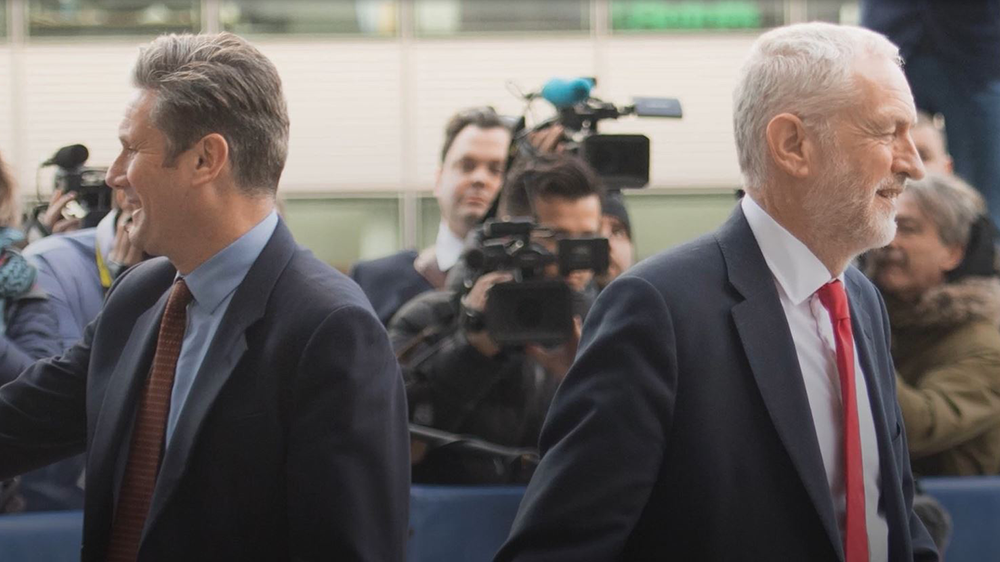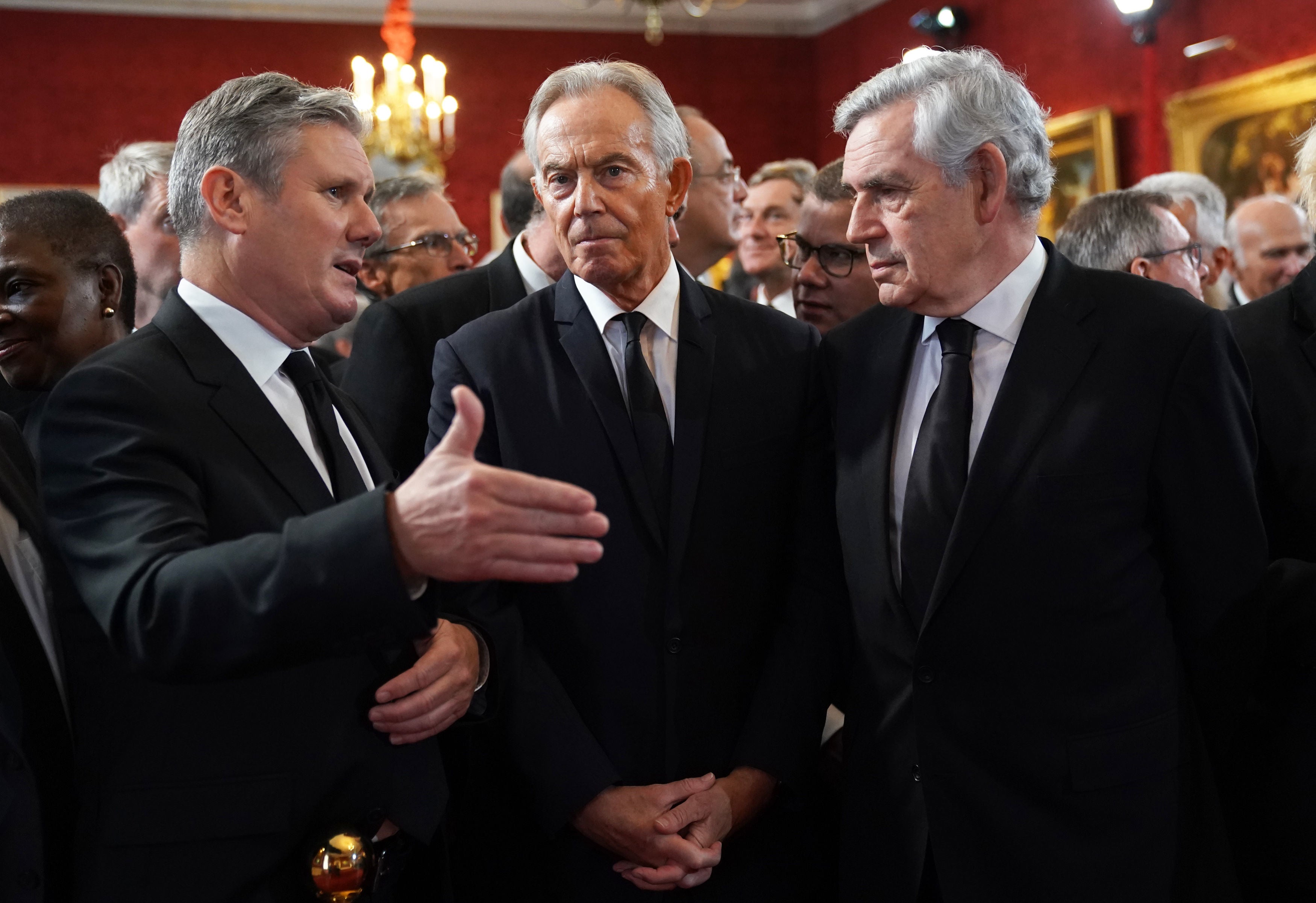The Independent's journalism is supported by our readers. When you purchase through links on our site, we may earn commission.
The man who would be king: Will the real Keir Starmer step forward?
A ruthless politician who has radically remodelled Labour and stands a good chance of winning power at the first attempt, but even his own party struggles to define the man himself, writes Andrew Grice


Who is the real Keir Starmer? Even Labour people who work closely with him admit privately they are not sure.
It is hard to pin a label on the Labour leader, partly because he is not a conventional politician. An MP only since 2015, the former director of public prosecutions is not steeped in party politics like many who reach the top of the political ladder.
Friends say that, unlike the former Labour prime ministers Tony Blair and Gordon Brown, Starmer would rather do something else than spend hours chewing the political fat late into the night.
Nor can Starmer be easily assigned to one of Labour’s tribes; rather, he seems to float above them. When he ran for the leadership in 2020, his ticket was seen as “Corbynism without Corbyn” – shrewd positioning because Labour’s membership had moved leftwards but was desperate to regain power. But as leader, Starmer has junked some of his 10 pledges – including tax rises for the top 5 per cent of earners; the abolition of university tuition fees and universal credit and “common ownership” of mail, energy and water.
As a result, Starmer is viewed with at least some suspicion by some members of every Labour faction. One ally told me: “The left accuse him of betrayal. The soft left who thought he was ‘one of us’ now think he is a Blairite. But the Blairites are not sure he is one of them.” There is an echo of Harold Wilson, the Labour leader Starmer says he admires most, who had to balance the party’s socialist and social democratic tribes, sometimes keeping them guessing about his own views.
Today’s rival groupings can agree on one thing: Starmer is a ruthless politician who has radically remodelled his party and now has a good chance of winning power at the first attempt. Few Labour people thought that possible after its worst election defeat since 1935 in 2019.

There was little sign of Starmer’s ruthless streak during his first year as leader, during which he prioritised uniting a deeply divided party. In adversity, Starmer developed steel. In 2021, Labour lost a parliamentary by-election in Hartlepool and came perilously close to another defeat in Batley and Spen, where an unofficial pact with the Liberal Democrats saved Labour’s skin. “If we had lost Batley and Spen, Keir would have been out,” one insider admits.
Since then, Starmer has adopted several chapters of Blair’s playbook. At the 2021 Labour conference, he pushed through a rule change requiring MPs to secure more nominations to stand in a leadership election, which could lock out a left-wing candidate, and made it more difficult for grassroots members to deselect sitting MPs. Starmer was forced to dilute his original plans, and even then, won only a narrow victory. Some Labour figures wondered whether it was worth the candle.
Today, Starmer’s move looks astute. It was the start of an internal revolution, not the end. As one of his closest allies told me: “This was the moment when the party stopped trying to feel good about itself, and started to have a laser-like focus on the voters’ priorities.”
As with the Tory government’s implosion into chaos last year, Starmer has been a lucky general in his internal battles. His most dramatic move was to block Jeremy Corbyn from standing as a Labour candidate at next year’s election – which, again, few would have thought possible when he succeeded him. Corbyn made himself an easy target by claiming that antisemitism allegations had been “dramatically overstated”.
Although Corbyn might run as an independent in the Islington North constituency he has represented since 1983, that will worry Starmer less than the wider signal his exclusion sends.

Arguably, Starmer has gone further than Blair, who decided not to suspend Corbyn for being a serial rebel; he voted against the government more than 400 times during New Labour’s 13 years in office. Blair, who spurned internal party reform once in Downing Street, decided to let sleeping left-wing dogs lie.
Starmer’s tougher stance is a rejoinder to Blairite critics who claim Starmer is “not Blair”. True, Labour is not in as strong a position today as it was before Blair won his 1997 landslide, and Starmer lacks Blair’s charisma. “People were able to project onto Tony the change they wanted to see for the country,” one senior Labour figure admits. “Keir has not reached that point yet.” There are still a lot of voters in the “don’t know” column, unsure about how Starmer would improve their lives, who need to be won over. Some 50 per cent of people don’t know what he stands for.
But, unlike political commentators like me, most voters do not compare Starmer to Blair but to Corbyn – a contest he wins.
Some of Starmer’s moves have been about judgement rather than luck. His ousting of left-winger Richard Leonard, who was succeeded as leader of Scottish Labour by the impressive Anas Sarwar, has helped the party reap maximum benefit from the SNP’s woes. A recent poll suggested Labour would win more seats than the SNP at next year’s election for the first time since 2010.
The online-only process was bulldozed through in just two weeks, with no face-to-face hustings. This was not a fair contest
Another example of Starmer’s ruthlessness is the way he deployed the party machine to weed out left-wingers during the process of selecting Labour’s candidates at the general election. Only two of the 123 Labour candidates chosen so far in vacated or target seats are on the left. Corbyn allies claim the party officials in charge are from “the Labour right” and left-wingers are being expelled for spurious reasons such as liking a tweet by a Green Party politician or Nicola Sturgeon. Some shadow cabinet members were shocked that Neal Lawson, the soft-left director of the Compass pressure group and a former Brown aide, is being threatened with expulsion for a two-year-old tweet describing cross-party cooperation as “proper grown-up progressive politics”.
All 62 appeals by expelled members have been rejected during what the left-wing Momentum group calls a “McCarthyite purge of the left”. Critics accuse Starmer of the very factionalism of which his allies accused Corbyn.
New constituency boundary changes handed the leadership another lever. Beth Winter, a left-winger who lost out to fellow MP Gerald Jones in the selection for the new Merthyr Tydfil and Upper Cynon seat after joining rail workers, nurses and teachers on picket lines, said: “The online-only process was bulldozed through in just two weeks, with no face-to-face hustings. This was not a fair contest.”
Some on the soft left think Starmer has gone too far by abandoning the party’s traditional “broad church” – notably by excluding Jamie Driscoll, the North of Tyne mayor, from the shortlist to become mayor of the wider North East region. Although dubbed “the last Corbynista in power”, Driscoll won widespread plaudits as a pragmatist who works well with Tory ministers and local businesses. His supposed crime, after the event, was to share a platform with filmmaker Ken Loach, who was booted out by Labour after defending members already expelled. Driscoll is adamant it was a cultural event, pointing out that three Loach films, including I, Daniel Blake, are set in the North East. Driscoll’s response has been to quit the party altogether, lashing out at Starmer’s “broken promises” in an extraordinary resignation letter. One Labour MP said: “I suspect they are burning DVDs of Ken Loach’s films in Starmer’s office.”

The Labour leader is leaving nothing to chance. He knows he might have only a slim Commons majority after the election – or even no majority, and might have to govern as a minority administration. So he does not want to swell the ranks of the 35-strong Socialist Campaign Group of left-wing MPs, who might find themselves in a pivotal position with the ability to seek concessions ahead of Commons votes – something they did not enjoy after Blair won three comfortable majorities. “We are not going to let the tail wag the dog,” one Starmer adviser said. In this scenario, a left bloc might persuade Starmer to seek a second election to secure a Commons majority big enough to implement his agenda without the left’s support. (Wilson twice opted for such an election – in 1966 and 1974.)
For now, left-wingers mostly keep their heads down, knowing Starmer would be happy to chop them off if they openly challenged him. They want to avoid the fate of Diane Abbott, currently suspended for suggesting Jewish people do not suffer racism.
For Labour centrists, the lesson of the Corbyn interregnum is that they must never let the left seize control of the party again. “We need to hammer nails in the coffin,” one said. Some left-wingers are convinced they will never regain power in the party. But nothing is forever in politics, as Corbyn’s unexpected rise to the leadership proved.
We are nothing without power. There is one key word here: win. That’s my job and I make no apologies for pursuing that
Starmer allies insist his remaking of the party enjoys Labour grassroots support. Membership has fallen by almost 170,000 since the peak of 564,000 under Corbyn; many of those attracted by him have walked away. But 48,000 people have joined in the past year. “We are a completely different party with a completely different ethos,” says Carolyn Harris, an MP and Starmer’s former parliamentary aide. Starmer denies that Labour’s 20-point lead in the polls is all down to the Tories’ self-inflicted wounds, saying: “So of course, it’s partly them but it is also us. We have changed the Labour Party.” For Starmer, it is all about winning. “We are nothing without power,” he told the Unite union last Thursday (13 July). “There is one key word here: win. That's my job and I make no apologies for pursuing that.”
Left-wingers note that Starmer has appointed former Blair aides to his office, including Matthew Doyle, his communications director, and Peter Hyman, who helped shape Starmer’s five missions for a Labour government.
Another key figure with links to Blair’s circle is Morgan McSweeney, the election campaign director.
However, friends insist that branding Starmer a “Blairite” is to misunderstand him. One describes the former human rights lawyer as “on the soft left” – even though, in a recent speech, he vowed his government would be New Labour “on steroids” and did not care if people thought he was a Conservative.
One aide explained: “We need to win over Tory voters. There is no escaping that.”
Yet his priority in most speeches and statements is “working people,” which annoys some Blairites, for whom that conjures up an image of cloth-capped trade unionists rather than the middle classes Blair wooed so effectively. Starmer, of course, needs both groups, and to rebuild support fractured by the combination of Corbyn and Brexit.
The Labour leader describes himself as “working class” – a useful contrast with Rishi Sunak – although some working-class voters rather doubt it, given he is a “Sir”. That’s why he constantly reminds us he is “the son of a toolmaker”.

Starmer’s policies are more radical than he is given credit for, such as a huge extension of workplace rights and repeal of Tory laws restricting industrial action, both welcomed by the unions. Labour will make a big offer on childcare and promises the biggest expansion of NHS staff in history.
However, he has also displayed ruthlessness over economic policy. Starmer and Rachel Reeves, the second most powerful person in the party, delayed its flagship pledge to spend £28bn a year on green investment until the second half of a five-year parliament.
Labour has also dropped a £3bn sales tax on tech firms.
The shadow chancellor exerts an iron grip on spending commitments, to the frustration of shadow ministers itching to push their pet projects. The Starmer-Reeves doctrine is that the party’s tough fiscal rules come first.
Their reluctance to pledge tax increases or a return to the EU single market or customs union reflects a determination to deny the Tories the ammunition to prime their favourite attack lines. It will still be fired, but Starmer will be a more elusive target than the Tories expect.
Starmer has undoubtedly accomplished the first target he set himself – remodelling his party. He has also achieved his second– making a damning critique of the government, admittedly with a lot of help from the Tories themselves. But these were only ever the platform for his third goal – setting out Labour’s positive alternative for the country’s future. This is a work in progress and far from complete. When it is finished, we will know a lot more about who Starmer really is. “Time for change” will be a powerful weapon after 14 years of Tory rule, but the Labour leader now needs to answer the question, “change to what?”
Join our commenting forum
Join thought-provoking conversations, follow other Independent readers and see their replies
Comments
Bookmark popover
Removed from bookmarks